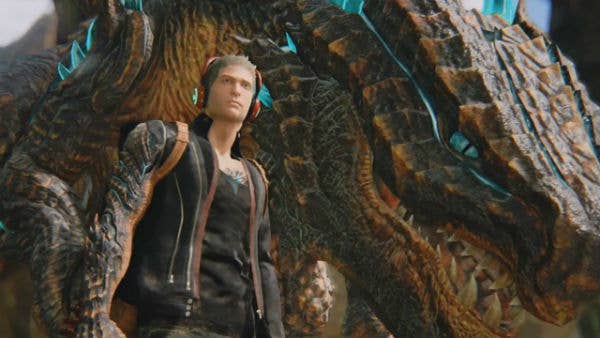Scalebound's Middling Reception Suggests Platinum Has Work to do Before 2017
Platinum's Xbox One exclusive lands with a dull thud at E3 2016.
This article first appeared on USgamer, a partner publication of VG247. Some content, such as this article, has been migrated to VG247 for posterity after USgamer's closure - but it has not been edited or further vetted by the VG247 team.
We're at E3 this week, covering the year's biggest gaming event. Be sure to check out all our coverage on our E3 2016 hub!
The complaints started almost as soon as Scalebound's Microsoft press conference demo concluded.
"Scalebound looks like they tried to merge gameplay from 3-4 games into a single clunky mess," wrote one NeoGAF poster. The comments continued along those lines: dreadful, obnoxious, lacking in energy—not exactly adjectives you would associate with a Platinum game.
Most of the disappointment has centered around the main character—a surprisingly generic figure who has Dante's wit but is otherwise unremarkable. Curiously, he actually resembles the Dante from the DMC remake, who was similarly derided by fans before finally being accepted, mostly because the game itself turned out to be pretty good. It's certainly not a given that Scalebound will go through a similar arc.

Scalebound was supposed to be salvation in a way for both Microsoft and Platinum. For Microsoft, it was an exclusive game by a studio with an impeccable reputation among core gamers. For Platinum, it was an opportunity to get a game onto a platform with a larger install base than the Wii U and score a sales success. It may still live up to expectations; but based on the initial reaction, it's in for an uphill climb.
My suspicion is that this is less to do with the actual quality of the game and more to do with how it's presented. The boss battle shown at Microsoft's press event was based on Scalebound's multiplayer mode, which is comparatively new territory for Platinum. What's more, Scalebound will purportedly be more of an action RPG than a pure action game like Bayonetta, which may explain why it feels a bit less flashy than other Platinum offerings.
Still, if Platinum wants Scalebound to be an action RPG, they will face some formidable competition. Among other games, comparisons to Dark Souls will be inevitable, and it's bound to look bad on that front. A less obvious example is Dragon's Dogma, which flew under the radar when it was first released but recently enjoyed a prominent release on the PC. Both games are known for fights with giant monsters, most of which are far more compelling than the giant crab monster featured in Scalebound.
I think Scalebound's biggest problem right now is that it just doesn't pop in the same way as most Platinum Games. It feels like wild art of Bayonetta and its ilk has been deliberately toned, perhaps to appeal to western audiences. There are some distinctly Platinum touches—the main character wearing headphones, not to mention the wisecrack-laden dialogue—but it still looks surprisingly bland. If anything, it looks something out of the last generation of action games, which were infamously derided for being grey and uninteresting.
Obviously, I'm certainly not going to write-off Scalebound based on one middling E3 showing. After all, this is Platinum we're talking about; and while they've moved troublingly toward licensed games and contract work, they've still managed to maintain a certain level of quality. I'm curious to see what Scalebound's dedicated single-player mode looks like, as well as whether its RPG trappings are more than skin deep.
But first impressions are always tough to shake, and the initial reception suggests that Scalebound isn't living up to expectations. Platinum has some work to do before 2017.
We're at E3 this week, covering the year's biggest gaming event. Be sure to check out all our coverage on our E3 2016 hub!


